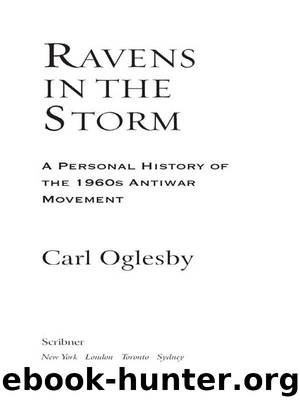Ravens in the Storm by Carl Oglesby

Author:Carl Oglesby
Language: eng
Format: epub
Publisher: Simon & Schuster
Published: 2008-07-15T00:00:00+00:00
WHATEVER THE CAUSE of my banning at Emory, whether the school president acted on his own instincts or because of pressure from the school’s trustees, and whether or not the trustees were themselves under pressure, 1968 was the year of the FBI’s “Cointelpro: New Left,” a program whose purpose was not merely to gather information on the antiwar movement but also to destroy it. The program specifically targeted SDS.
For those not conversant with spookspeak, let me note that “cointelpro” is a contraction of “counterintelligence program.” It significantly differs from intelligence-gathering, which entails bugging phones and the like and aims merely to collect information. Counterintelligence, on the other hand, entails active disruption of the targets’ activities, organizations, and lives. One technique is to plant false stories with “assets” or collaborators, often in the media or with a target’s employer, or through the use of penetration agents. Another technique is to spread false gossip about the targets to turn them against one another. A favorite method, known as “black jacketing,” is to spread rumors that targets are informers.
More aggressively, trained provocateurs take the role of ultramilitants and try to lure protesters into felonies, or simply commit the felonies themselves, preferably on camera, to bring an organization into public disgrace.
We had certainly had agents among us from the beginning. An FBI report released decades later revealed that the FBI had actually placed an informer, identity unknown, in SDS’s Chicago national office as early as May 1966.
The FBI’s original mission in placing agents among us was possibly just to find out what we were up to. We had no big problem with that. We, too, sometimes wondered.
But altogether different was the infiltration of our ranks by provocateurs whose explicit purpose was to destroy us. Their tactical premise was that we would grow less sympathetic to the public the more violent we appeared to be. As presidential adviser McGeorge Bundy told Johnson in November 1967, “One of the few things that helps us right now is public distaste for the violent doves.” 15
This points up a basic lesson for the politics of protest: A commitment to nonviolence is not merely a moral imperative, but a strategic one as well. This is true for a very simple reason: The less sympathetic a protest appears to the public, the more daring can be the repressive forces mobilized against it. The provocateur has not the least difficulty figuring this out. Do you want to whack the antiwar movement? Okay, don’t whack it outright, at least not until the movement’s reputation has been blackened, because that will only fire people up and make you look bad in the morning news. Instead, just grow long hair, put on an SDS uniform (ragged jeans and a T-shirt with a Grateful Dead logo will do fine), and do something stupidly violent, where it will be sure to be picked up by a reporter and a camera.
But by no means do I claim, of course, that all among us who came to adopt violent tactics were cops.
Download
This site does not store any files on its server. We only index and link to content provided by other sites. Please contact the content providers to delete copyright contents if any and email us, we'll remove relevant links or contents immediately.
| Africa | Asia |
| Canadian | Europe |
| Holocaust | Latin America |
| Middle East | United States |
Fanny Burney by Claire Harman(26603)
Empire of the Sikhs by Patwant Singh(23086)
Out of India by Michael Foss(16853)
Leonardo da Vinci by Walter Isaacson(13337)
Small Great Things by Jodi Picoult(7143)
The Six Wives Of Henry VIII (WOMEN IN HISTORY) by Fraser Antonia(5515)
The Wind in My Hair by Masih Alinejad(5095)
A Higher Loyalty: Truth, Lies, and Leadership by James Comey(4964)
The Crown by Robert Lacey(4817)
The Lonely City by Olivia Laing(4802)
Millionaire: The Philanderer, Gambler, and Duelist Who Invented Modern Finance by Janet Gleeson(4478)
The Iron Duke by The Iron Duke(4356)
Papillon (English) by Henri Charrière(4274)
Sticky Fingers by Joe Hagan(4199)
Joan of Arc by Mary Gordon(4113)
Alive: The Story of the Andes Survivors by Piers Paul Read(4033)
Stalin by Stephen Kotkin(3969)
Aleister Crowley: The Biography by Tobias Churton(3640)
Ants Among Elephants by Sujatha Gidla(3467)
